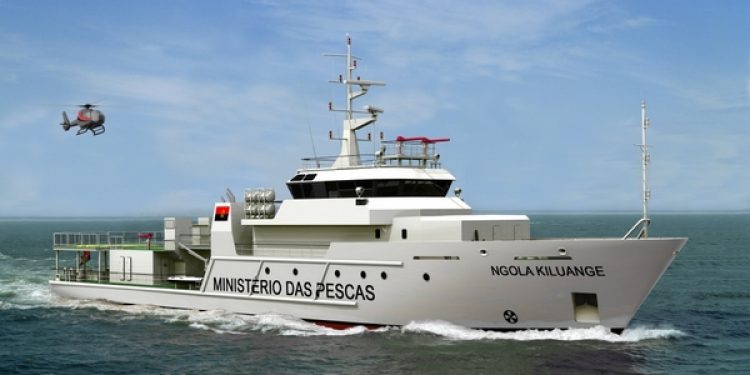Damen Shipyards Galati is building the Ngola Kiluange, a Fishery Inspection Surveillance Vessel (FISV) 6210, for the Angolan Ministry of Agriculture, Rural Development and Fisheries. With another two ships under construction, the Angolan government is set to strengthen its knowledge of and control over its rich fishing grounds.
The spectators at Damen’s Romania based Galati Shipyard were treated to a moment of suspense when the 62 m Nngola Kiluange sharply heeled over at her launch. As people drew their breath it elegantly sprang back, keeping her balance perfectly. The Angolan Ministry of Agriculture, Rural Development and Fisheries purchased the slender multipurpose vessel. Another vessel of this type is currently under construction at the Galati Shipyard, as is a smaller, 28 m long Fishery Research Vessel (an Damen FRV 2810), also commissioned by the Angolan Ministry. The threefold order has materialised under a unique collaboration of Damen Shipyards, the Dutch Government and ING Bank. The latter two co-financed the project.
Given the exclusive economic zone at West-Africa’s Atlantic coast, holding vast and rich fishing grounds, the acquisition of these vessels represents a real opportunity for the Angolan Ministry. The fishing sector is one of Angola’s largest economic sectors and its territorial waters are extremely alluring for illegal fishing. Under a SADC regional programme the country collaborates with Namibia and South Africa to protect and survey the fishing grounds. The FISV Ngola Kiluange can also be brought into action for salvaging and various other jobs. Damen has a long and proven experience in building hydrographic research vessels. Their standardised system allows them to meet with every requirement in terms of hull shape, sensor suite, systems and regulations. “Imagine the versatility of these vessels”, says Friso Visser, Regional Director Africa.
The deal was struck under a currently discontinued program of the Dutch Ministry of Foreign Affairs, called ORET, which supported sustainable investment in infrastructural projects in developing countries. Regulations for such deals were very strict, contemplates Friso Visser. “We really had to explain the Dutch mania for organisation to our Angolan counterparts. Fortunately, our relationship goes back a long way and we intend to deepen it even further.”
The ORET programme regulated Dutch-Angolan co-operation within a clear institutional framework. Education, training and building financial reserves for maintenance and replacement were all compulsory parts of the deal. Some of these requirements are also part and parcel of the Damen philosophy. The delivery of spare parts is customary, training and education are regularly given, and special vessel maintenance programs can be obtained. Damen Shipyards Cape Town provides the necessary services. Thus the slogan ‘Africa for Africa’ truly exceeds its verbal ex









